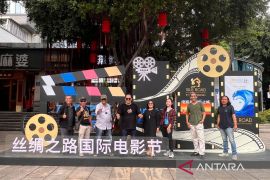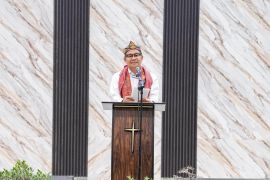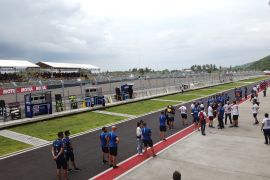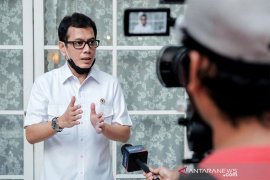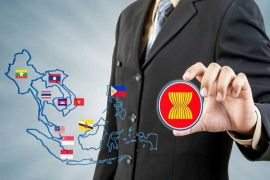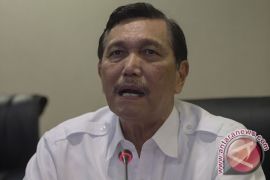Young businessmen, however, believe that Indonesia, in the face of the AEC, needs to develop its creative economic sector as one of the key economic aspects.Jakarta (ANTARA News) - On December 31, 2015, the 10 member countries of the Association of Southeast Asian Nations (ASEAN) will begin implementing a regional economic integration, the ASEAN Economic Community (AEC), to establish a common market.
The AEC will lead to a freer flow of goods, services, investment and skilled labor among Indonesia, Malaysia, Thailand, Singapore, the Philippines, Brunei Darussalam, Vietnam, Cambodia, Laos and Myanmar.
The common market, if successful, would create 14 million jobs by 2025 and improve the livelihood of 600 million people across all the 10 states, according to a joint study by the International Labor Organization (ILO) and Asian Development Bank (ADB) last year.
The government of Indonesia, the largest nation in the regional organization, has claimed that it is ready to carry out the AEC agreement.
ASEAN functional cooperation director of the Indonesian Foreign Affairs Ministry, J.S. George Lantu, said Indonesian workers have no cause for concern in facing the AEC.
"There are eight sectors open to workers from other ASEAN countries under the AEC scheme. In the negotiations, the Indonesian delegation considered the benefits and strengths that Indonesia has in the eight sectors," George said recently.
He said in four areas, Indonesia has an upper hand. These are availability of technicians, paramedics, tourism, and architecture.
The other four areas are related to accounting, survey, medical practitioners and dentists.
Vice President M Jusuf Kalla has reassured the Indonesian people not to harbor any worries about the free market era under the AEC, but did caution about a possible brain drain.
"There is no need to worry about the ASEAN cooperation pact as we have a huge market. In fact, we are worried about a possible shortage of professionals," Kalla stated while opening a congress of the Indonesian Chamber of Commerce and Industry (Kadin) in November 2015.
He pointed out that several professionals had left the Philippines for other countries.
"Hence, if businessmen do not conduct their businesses properly, and professionals are not satisfied, they will leave for other countries, lured by better offers, and we will face a shortage of professionals. Therefore, we are worried about that," he clarified.
Several parties have voiced concerns that foreign workers might seek employment in Indonesia following the implementation of the AEC.
Kalla affirmed that Indonesias strength is its huge population, thus accounting for a large number of consumers and workers. Besides, the country has abundant natural resources.
Young businessmen, however, believe that Indonesia, in the face of the AEC, needs to develop its creative economic sector as one of the key economic aspects.
"The AEC faces us, and Indonesia should continue to develop its creative economic sector," Anggawira, the chairman of the Indonesian Young Businessman Association (Hipmi) in charge of organizational affairs, stated on December 11.
Indonesias creative economy has a strong potential and offers unending renewable resources, unlike natural resources, according to Anggawira.
The creative economic sector could also strengthen the identity of Indonesia, which has rich local wisdom.
Meanwhile, the Creative Economy Board called on the Indonesian youth from across the country to capitalize on the opportunities arising from the implementation of the AEC.
"The youth should be quick to grab any opportunity when the AEC comes into force this year-end," Hari Santosa Sungkari, a deputy for infrastructure at the Creative Economy Body, said recently.
Sungkari noted that the free market at the regional level will automatically expand the market base for creative products.
Earlier, Trade Minister Thomas Lembong had expressed optimism that the countrys small- and medium-scale enterprises (SMEs) would be ready to face the AEC, effective January 1, 2016.
"I have traveled to various regions and visited several SME exhibitions. I am confident as several SMEs have recorded success stories and view the AEC as an opportunity rather than being apprehensive, coming under pressure or opposing the ASEAN integration," the minister affirmed in Jakarta on December 7, 2015.
To support the SMEs, the government has issued policies on business deregulation and debureaucratization to simplify licensing processes and address overlapping regulations, according to Lembong.
State Enterprises Minister Rini Soemarno also recently remarked that state-owned companies are ready for the implementation of the AEC by establishing synergy between state enterprises (BUMNs).
"We should not be afraid of facing the AEC. Synergy among BUMNs could strengthen domestic companies, and foreign firms from other ASEAN member countries keen to enter (Indonesia) would not be able to succeed as our BUMNs are stronger," Minister Rini stated on December 10, 2015.
Strengthening synergy among BUMNs could help maintain Indonesias position in the AEC, according to the minister.
In the meantime, Indonesia should be able to take full advantage of the AEC and not merely be a spectator, Deputy Chairman of the Peoples Consultative Assembly (MPR) Hidayat Nur Wahid noted.
"I am afraid that Indonesia would be more of a spectator as AEC comes into effect," Wahid remarked on December 9.
He pointed out that several foreign products, more competitive in price and quality, would flood the domestic market following the implementation of the AEC.
It is feared that foreign workers, who are more competitive in terms of their skills, would seek jobs in Indonesia, and the country would only serve as a good market for other ASEAN countries, he added.
Several Thai citizens are already studying Indonesian language ahead of the implementation of the AEC, he revealed.(*)
Reporter: Fardah
Editor: Heru Purwanto
Copyright © ANTARA 2015



